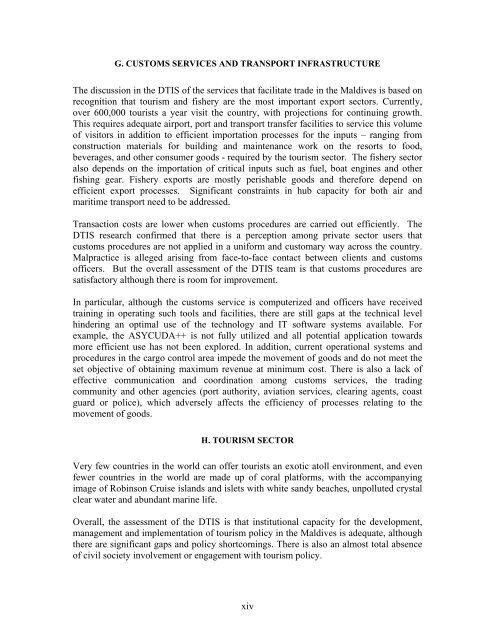DTIS, Volume I - Enhanced Integrated Framework (EIF)
DTIS, Volume I - Enhanced Integrated Framework (EIF)
DTIS, Volume I - Enhanced Integrated Framework (EIF)
You also want an ePaper? Increase the reach of your titles
YUMPU automatically turns print PDFs into web optimized ePapers that Google loves.
G. CUSTOMS SERVICES AND TRANSPORT INFRASTRUCTURE<br />
The discussion in the <strong>DTIS</strong> of the services that facilitate trade in the Maldives is based on<br />
recognition that tourism and fishery are the most important export sectors. Currently,<br />
over 600,000 tourists a year visit the country, with projections for continuing growth.<br />
This requires adequate airport, port and transport transfer facilities to service this volume<br />
of visitors in addition to efficient importation processes for the inputs – ranging from<br />
construction materials for building and maintenance work on the resorts to food,<br />
beverages, and other consumer goods - required by the tourism sector. The fishery sector<br />
also depends on the importation of critical inputs such as fuel, boat engines and other<br />
fishing gear. Fishery exports are mostly perishable goods and therefore depend on<br />
efficient export processes. Significant constraints in hub capacity for both air and<br />
maritime transport need to be addressed.<br />
Transaction costs are lower when customs procedures are carried out efficiently. The<br />
<strong>DTIS</strong> research confirmed that there is a perception among private sector users that<br />
customs procedures are not applied in a uniform and customary way across the country.<br />
Malpractice is alleged arising from face-to-face contact between clients and customs<br />
officers. But the overall assessment of the <strong>DTIS</strong> team is that customs procedures are<br />
satisfactory although there is room for improvement.<br />
In particular, although the customs service is computerized and officers have received<br />
training in operating such tools and facilities, there are still gaps at the technical level<br />
hindering an optimal use of the technology and IT software systems available. For<br />
example, the ASYCUDA++ is not fully utilized and all potential application towards<br />
more efficient use has not been explored. In addition, current operational systems and<br />
procedures in the cargo control area impede the movement of goods and do not meet the<br />
set objective of obtaining maximum revenue at minimum cost. There is also a lack of<br />
effective communication and coordination among customs services, the trading<br />
community and other agencies (port authority, aviation services, clearing agents, coast<br />
guard or police), which adversely affects the efficiency of processes relating to the<br />
movement of goods.<br />
H. TOURISM SECTOR<br />
Very few countries in the world can offer tourists an exotic atoll environment, and even<br />
fewer countries in the world are made up of coral platforms, with the accompanying<br />
image of Robinson Cruise islands and islets with white sandy beaches, unpolluted crystal<br />
clear water and abundant marine life.<br />
Overall, the assessment of the <strong>DTIS</strong> is that institutional capacity for the development,<br />
management and implementation of tourism policy in the Maldives is adequate, although<br />
there are significant gaps and policy shortcomings. There is also an almost total absence<br />
of civil society involvement or engagement with tourism policy.<br />
xiv
















